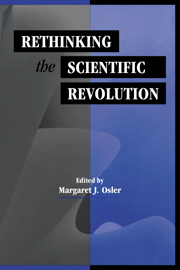2 - Newton as Final Cause and First Mover
Published online by Cambridge University Press: 25 October 2009
Summary
Friends and colleagues, it is an honor to be asked to speak to you this evening, and I thank you for the occasion. It is, however, entirely possible that you will regret granting me this forum, for I intend to undermine one of our most hallowed explanatory frameworks, that of the Scientific Revolution – almost always written with capital letters, of course.
I am well aware that something happened in the sixteenth and seventeenth centuries that human beings have since come to regard as revolutionary – revolutionary, that is, in the modern sense of that word: in I. B. Cohen's definition of political revolution, “a change that is sudden, radical, and complete” Or, in the words of Arthur Marwick, who has scant patience with overuse of the term, “a significant change in political structure carried through within a fairly short space of time.” Marwick's examples are the French revolutions of 1789, 1830, and 1848; the Russian one of 1917; the Mexican one of 1906. We must keep in mind that the modern meaning of revolution did develop in the political sphere. When we use it for scientific thought, we are in fact using a metaphor.
But as Cohen demonstrated so well in 1985, the word “revolution” hardly began to acquire its modern meaning until the eighteenth century; before then the term had carried the implication of a cyclical turning, a turning around, or even a turning back, a return to an original position, just as Copernicus used it in the title of his book, On the Revolutions of the Celestial Spheres.
- Type
- Chapter
- Information
- Rethinking the Scientific Revolution , pp. 25 - 40Publisher: Cambridge University PressPrint publication year: 2000
- 5
- Cited by



